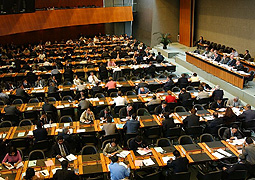
|
| Majority rule: Decisions taken in the WTO are negotiated, accountable and democratic. It does not tell governments how to conduct their trade policies. |
With the holding of the World Trade Organisation 6th Ministerial Conference in Hong Kong December 13 to 18, many are keen to learn more about the body.
There are different views on the pros and cons of the WTO's multilateral trading system. Is it a body that promotes free trade and offers an arena for countries to thrash out their differences on trade issues? Or is it a dictatorial tool of the rich and powerful?
The debate will probably never end. However, the WTO says the criticisms are often based on fundamental misunderstandings of the way the body works.
In its booklet 10 Common Misunderstandings about the WTO, it clears up some popular misconceptions. The common misunderstandings are:
* the WTO dictates policy;
* the WTO is undemocratic;
* the WTO is for free trade at any cost;
* commercial interests take priority over development;
* commercial interests take priority over the environment;
* commercial interests take priority over health and safety;
* the WTO destroys jobs, worsens poverty;
* small countries are powerless in the WTO;
* the WTO is the tool of powerful lobbies; and,
* weaker countries are forced to join the WTO.
Member-driven body
The WTO says it does not tell governments how to conduct their trade policies. The rules of the WTO system are agreements resulting from negotiations among member governments. The rules are ratified by members' parliaments, and decisions taken in the WTO are virtually all made by consensus among all members.
Decisions taken in the WTO are negotiated, accountable and democratic. In principle, that's even more democratic than majority rule because no decision is taken until everyone agrees.
The only occasion when a WTO body can have a direct impact on a government's policies is when a dispute is brought to the WTO and if that leads to a ruling by the Dispute Settlement Body.
Even then, the scope of the ruling is narrow: it is simply a judgement or interpretation of whether a government has broken one of the WTO's agreements - agreements that the infringing government had itself accepted. If a government has broken a commitment it has to conform.
One of the WTO system's principles is for countries to lower their trade barriers and allow trade to flow more freely. But just how low those barriers should go is something member countries bargain with each other.
The rules written into the agreements allow barriers to be lowered gradually so that domestic producers can adjust. They have special provisions that take into account the situations that developing countries face. They also spell out when and how governments can protect their domestic producers.
Development, environment considered
In the WTO, commercial interests do not take priority over development. The WTO agreements are full of provisions taking the interests of development into account. Developing countries are allowed more time to apply numerous provisions of the WTO agreement.
The least-developed countries receive special treatment, including exemption from many provisions. The needs of development can also be used to justify actions that might not normally be allowed under the agreements, for example governments giving certain subsidies.
Meanwhile, many provisions in the WTO rules take environmental, health and safety concerns specifically into account and allow countries to take actions to protect human, animal or plant life or health, and to conserve exhaustible natural resources.
What's important in the WTO's rules is that measures taken must not be unfair. For example, they must not discriminate. You cannot be lenient with your own producers and at the same time be strict with foreign goods and services. Nor can you discriminate between different trading partners.
Free trade reduces poverty
Refuting the accusation it destroys jobs or widens the wealth gap, the WTO believes freer-flowing and more stable trade can be a powerful force for creating jobs and reducing poverty.
Although workers who were previously protected may face new competition when trade barriers are lowered, the issue can be addressed by proper adjustments, the WTO says. In any case, the alternative of protectionism is not the solution because it raises costs and encourages inefficiency.
The WTO negotiation system also offers governments a means to reduce the influence of narrow vested interests.
Since the outcome of a trade negotiation round has to be a balance of interests, governments can find it easier to reject pressure from particular lobbying groups by arguing it had to accept the overall package in the interests of the country as a whole.
Weak countries have a say
In the WTO, small countries are not powerless. As everyone must follow the same rules in the system, developing countries have a better chance to challenge some actions taken by developed ones. Without the WTO, they would be powerless to act against their stronger trading partners.
Most countries feel it is better to be in the WTO system because even a small country can automatically enjoy the benefits all WTO members grant to each other. Weaker countries are not forced to join the WTO.
The alternative would be to negotiate bilateral trade agreements with each trading partner. That could include regularly negotiating the regular renewal of commitments. For this, governments would need more resources, a serious problem for small countries.
And in bilateral negotiations smaller countries are weaker. By joining the WTO, small countries can increase their bargaining power by forming alliances with other nations that have common interests.
|